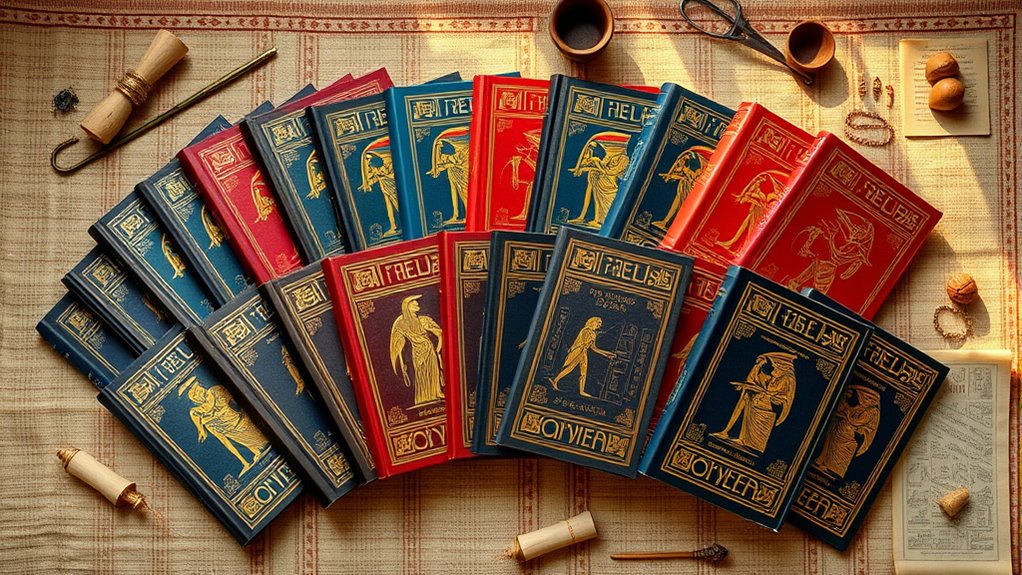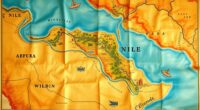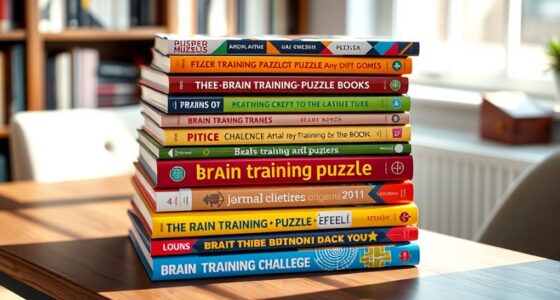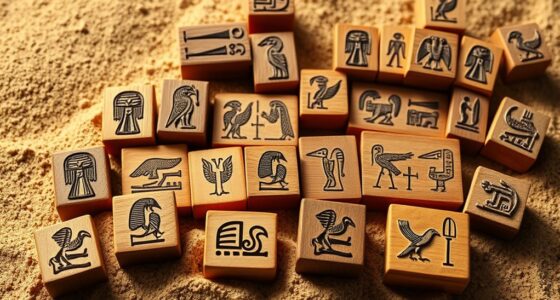If you’re looking for the 14 best Egyptian mythology references, I recommend a mix of beginner guides, exhaustive encyclopedias, and visually engaging books for all ages. From *Uncovering Egyptian Mythology* to *The Complete Gods and Goddesses*, these titles cover gods, myths, and rituals with clarity and vivid images. Choose based on your interest level, whether casual or scholarly. Keep going to discover more about these fascinating stories and historical insights.
Key Takeaways
- Choose comprehensive encyclopedias like *The Complete Gods and Goddesses* for detailed, scholarly insights into Egyptian deities.
- Opt for beginner-friendly guides such as *Uncovering Egyptian Mythology* for engaging narratives and accessible explanations.
- Include visual-rich books like *Treasury of Egyptian Mythology* for stunning illustrations and educational content suitable for all ages.
- Consider authoritative reference works like *The Oxford Essential Guide to Egyptian Mythology* for concise, reliable summaries of key myths.
- Balance scholarly texts with beautifully crafted editions like *The Egyptian Book of the Dead* for both learning and aesthetic appeal.
Uncovering Egyptian Mythology: A Beginner’s Guide to Gods, Goddesses & Ancient Creatures

Are you curious about the fascinating world of ancient Egypt and enthusiastic to understand its gods, goddesses, and mythical creatures? “Uncovering Egyptian Mythology” is the perfect starting point. It dives into Egypt’s rich mythological landscape, revealing stories about divine beings and legendary creatures that shaped their culture. I love how it explores themes of creation, life, death, and natural cycles, providing vivid descriptions and engaging stories. This guide goes beyond the famous pyramids and mummies, offering insight into the beliefs and rituals that defined Egyptian civilization. It’s an excellent resource whether you’re new to the subject or seeking inspiration for storytelling.
Best For: beginners and enthusiasts eager to explore the myths, gods, and legends of ancient Egypt in a detailed yet accessible way.
Pros:
- Well-researched and engaging, providing vivid descriptions and captivating stories.
- Suitable for a wide audience, from casual readers to serious students and storytellers.
- Highlights regional variations and the complexity of Egyptian mythology, enriching understanding.
Cons:
- Lacks visual aids such as illustrations, maps, and pronunciation guides, which could enhance comprehension.
- More of a reference guide than casual reading, potentially less appealing for those seeking light content.
- Could benefit from additional graphics to better visualize mythological scenes and deities.
World Mythology 101: Mythology Chronicles for Beginners

If you’re new to mythology but enthusiastic to explore beyond the familiar Greek and Norse tales, “Egyptian Mythology Books” within “World Mythology 101” is an ideal starting point. This collection offers lively, easy-to-understand stories that introduce gods, monsters, and legendary heroes from various cultures, including Egypt. It simplifies complex myths with humor, action, and surprising facts, making ancient stories accessible. Whether you’re interested in Ragnarok, Celtic legends, or Egyptian gods, this series provides a fun, energetic overview. It’s perfect for beginners, pop culture fans, or anyone eager to see how mythologies connect across civilizations.
Best For: beginners and pop culture enthusiasts eager to explore diverse mythologies beyond Greek and Norse stories with engaging, accessible narratives.
Pros:
- Simplifies complex myths with humor, action, and surprising facts, making stories easy to understand.
- Covers a wide range of cultures including Egyptian, Celtic, Greek, and Norse, offering diverse mythological knowledge.
- Enhances understanding of pop culture references and provides an energetic, fun reading experience.
Cons:
- Artwork quality can be inconsistent, with some editions featuring less detailed black-and-white illustrations.
- Audiobook inclusion is inconsistent; some readers report it was not available despite claims.
- The structure, while split into parts, may still feel overwhelming for absolute beginners seeking very concise summaries.
Treasury of Egyptian Mythology Book

The Treasury of Egyptian Mythology Book stands out as an excellent choice for middle school students and older readers who want to explore Egyptian gods and stories through stunning visuals and engaging narratives. Its beautiful illustrations fill full pages, making learning visually appealing and immersive. The well-crafted stories, combined with detailed inset boxes about Egyptian culture, offer both entertainment and education. The durable construction makes it a perfect gift, and it’s suitable for read-alouds with younger children. Overall, this book makes Egyptian mythology accessible, enthralling, and richly informative for anyone interested in ancient Egypt’s fascinating deities and traditions.
Best For: middle school students, mythology enthusiasts, and families seeking a visually stunning and educational introduction to Egyptian gods and stories.
Pros:
- Beautiful full-page illustrations that enhance storytelling and engagement
- Well-researched, compelling narratives suitable for a range of ages
- Includes educational inset boxes on Egyptian culture, funeral practices, and hieroglyphs
Cons:
- Some stories and details may omit certain gods or mythological variations
- Vocabulary could be challenging for very young children without adult guidance
- Minor flaws like physical defects or limited coverage of all deities
The Complete Gods and Goddesses of Ancient Egypt

For anyone seeking a clear and all-encompassing overview of Egyptian deities, “Egyptian Mythology Books” stands out as an ideal resource. This guide dives into the mythology, iconography, and worship of major gods like Re, Amun, Thoth, Horus, and Anubis, alongside lesser-known deities. It organizes entries by shape—animal, human, or object—making it easy to find specific gods. Lavishly illustrated with photographs and drawings, it balances scholarly rigor with readability. While it doesn’t cover every deity or myth in depth, it offers a comprehensive, accessible overview suited for beginners, students, and enthusiasts alike.
Best For: enthusiasts, students, and scholars seeking a beautifully illustrated, comprehensive overview of Egyptian gods and goddesses that balances clarity and scholarly accuracy.
Pros:
- Lavishly illustrated with photographs and drawings that enhance understanding of iconography and mythology
- Well-organized by deity shape, facilitating quick and easy lookup
- Balances scholarly rigor with readability, making complex concepts accessible to a broad audience
Cons:
- Lacks detailed mythological narratives and in-depth discussions of individual deities
- Limited visual content for minor gods and fewer indexes such as hieroglyphic or shape indexes
- Does not include footnotes or references within the text, relying primarily on an extensive bibliography
Egyptian Mythology Guide to Gods and Traditions
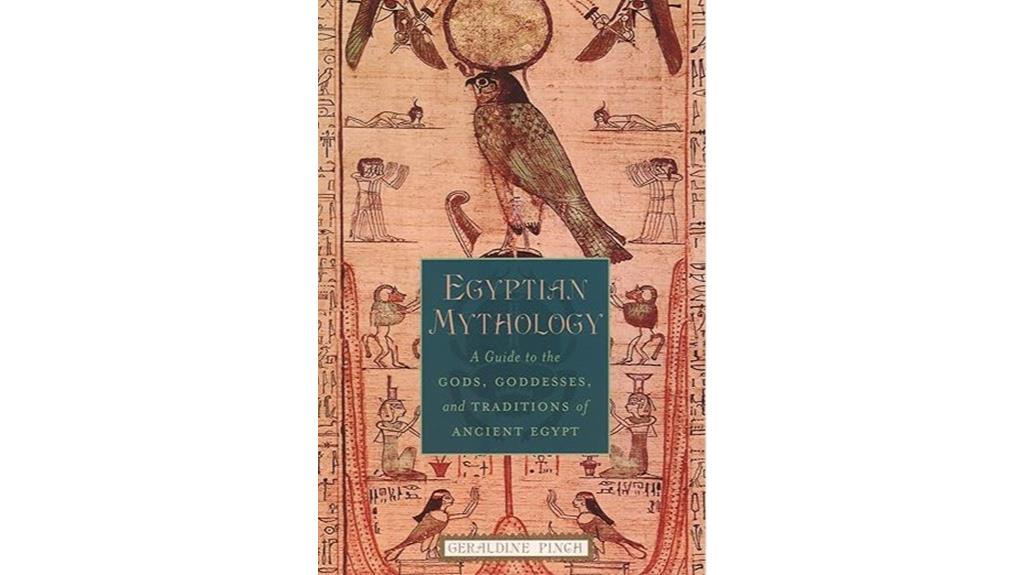
This Egyptian Mythology Guide to Gods and Traditions is perfect for readers seeking a clear, accessible overview of key deities and religious beliefs without wading through dense scholarly jargon. I appreciate how it highlights major gods like Ra, Osiris, and Isis, explaining their origins and roles in Egyptian life. The book emphasizes the interconnectedness of deities and how mythologies evolved over time, simplifying complex concepts. It also explores Egypt’s view of life, death, and rebirth through divine stories. With excellent illustrations and straightforward explanations, it’s an ideal starting point for anyone curious about Egyptian religion, blending interpretation with historical context for a well-rounded understanding.
Best For: readers who want a clear, engaging introduction to Egyptian mythology without complex scholarly language.
Pros:
- Accessible and easy to understand for beginners and general readers
- Well-illustrated with excellent visuals enhancing comprehension
- Focuses on key deities and themes, providing a practical overview of Egyptian beliefs
Cons:
- Lacks detailed myth narratives or extensive scholarly references
- Not suitable for advanced researchers seeking in-depth analysis
- Limited sourcing, which may reduce credibility for academic purposes
The Egyptian Book of the Dead (Deluxe Hardbound Edition)
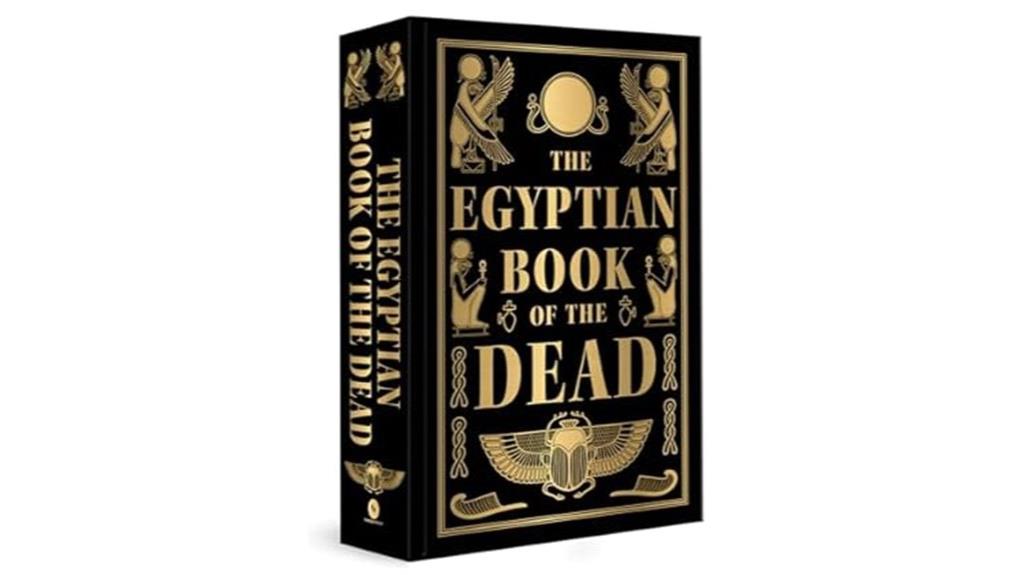
If you’re passionate about uncovering Egypt’s rich mythology and want a beautifully crafted edition, the Egyptian Book of the Dead (Deluxe Hardbound Edition) is perfect for you. This book offers extensive Egyptian facts, delving into their history, culture, and mythology. I found it fascinating, making me curious and adding an air of mystery to ancient Egypt. The quality is exceptional, and many readers, including myself, appreciate its craftsmanship. It’s not overly thick, making it easy to read and enjoy without feeling overwhelmed. Honestly, I believe every Egypt enthusiast should own this book—it’s a must-buy for anyone eager to explore Egypt’s divine past.
Best For: enthusiasts of Egyptian history, mythology, and culture seeking a beautifully crafted, informative, and engaging book about ancient Egypt.
Pros:
- Provides extensive and detailed facts about Egypt’s history, culture, and mythology
- Beautifully crafted with high-quality craftsmanship and a deluxe hardcover design
- Easy to read due to its manageable thickness, making it accessible for casual readers
Cons:
- The media content could not be loaded, limiting visual engagement
- Might be considered too brief for those seeking an in-depth academic resource
- As a hardcover edition, it may be less portable for carrying around frequently
Uncovering Egyptian Mythology: A Beginner’s Guide to Egyptian Gods and Monsters
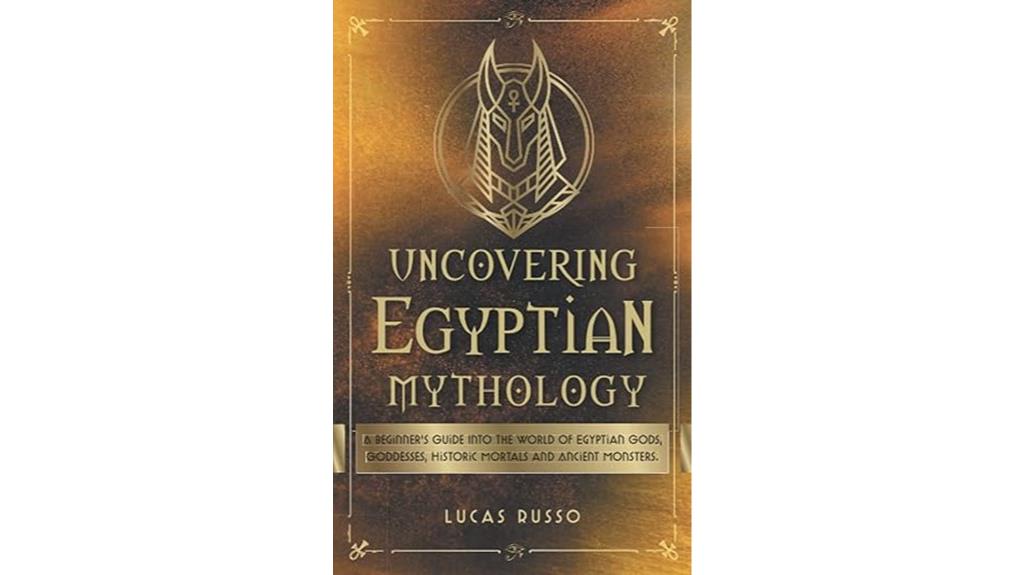
Uncovering Egyptian Mythology: A Beginner’s Guide to Egyptian Gods and Monsters is the perfect starting point for anyone enthusiastic to explore Egypt’s rich mythological world. I love how it dives into gods, goddesses, monsters, and mythological stories, revealing themes of creation, life, death, and natural cycles. The book goes beyond pyramids and mummies, offering vivid descriptions and fascinating facts about divine beings and ancient customs. It’s accessible but detailed, making it ideal for enthusiasts, writers, and students alike. With regional variations and mythological diversity highlighted, it truly captures Egypt’s cultural complexity, inspiring curiosity and a deeper understanding of this mysterious civilization.
Best For: enthusiasts, writers, students, and anyone interested in exploring Egypt’s rich mythological landscape with detailed stories, facts, and cultural insights.
Pros:
- Well-researched, thorough, and engaging writing style that makes complex topics accessible
- Offers vivid descriptions, fascinating facts, and mythological stories that enhance understanding
- Highlights regional variations and cultural diversity within Egyptian mythology, adding depth
Cons:
- Lacks additional visual aids such as pronunciation guides and illustrations, which could enhance learning
- Being more of a reference guide, it may not appeal to those seeking casual or casual reading experiences
- The detailed content might be overwhelming for absolute beginners without prior interest in Egyptian mythology
The Complete Encyclopedia of Egyptian Deities

Are you searching for a thorough and reliable resource on ancient Egyptian deities? “The Complete Encyclopedia of Egyptian Deities” by Tamara Siuda stands out as an ideal guide for both beginners and seasoned researchers. This book offers detailed, accessible entries on a wide range of gods, goddesses, and spirits, including well-known and lesser-known Netjeru. It covers names, mythological roles, cult centers, festivals, and modern worship practices. The physical quality is impressive—glossy pages, beautiful illustrations, and durable design. Overall, it’s an invaluable reference that deepens understanding and appreciation of Egypt’s divine landscape, making it an essential addition to any Egyptology collection.
Best For: enthusiasts, students, and researchers seeking a comprehensive, visually stunning guide to ancient Egyptian deities and spirituality.
Pros:
- Highly detailed and accurate entries suitable for both beginners and experts
- Beautiful physical presentation with glossy pages, rich illustrations, and durable design
- Extensive coverage of deities, spirits, cult centers, festivals, and modern worship practices
Cons:
- The physical book is quite heavy and large, which may be less portable
- Some readers might find the extensive detail overwhelming if seeking quick references
- Minor issues like shipping damage have been reported, though overall satisfaction remains high
The Oxford Essential Guide to Egyptian Mythology

The Oxford Essential Guide to Egyptian Mythology is an excellent choice for beginners and enthusiasts seeking a focused overview of Egyptian gods, religious practices, and ritual objects. I find it a handy reference that compiles articles from The Oxford Encyclopedia of Ancient Egypt, making complex topics accessible. It covers major deities, rituals, and artifacts like offering tables and funerary masks, providing authoritative insights from leading scholars. While it doesn’t include mythological texts or temple details, it’s perfect for those wanting a solid foundation. Its small size and clear summaries make it a practical starting point, especially if you’re new to Egyptology or want to deepen your understanding.
Best For: beginners and enthusiasts seeking an accessible overview of Egyptian gods, rituals, and artifacts with authoritative insights.
Pros:
- Concise summaries and clear explanations make complex topics accessible
- Focuses on major deities, rituals, and ritual objects, providing a solid foundational knowledge
- Compact size and affordable price make it practical and easy to use as a reference
Cons:
- Omits detailed mythological texts, hymns, and temple architecture, limiting depth in those areas
- Small typeface can be difficult to read for some users
- Selection appears somewhat haphazard, possibly leaving out key topics from the full scope of Egyptian religion
Egyptian Myths (Ancient Myths)

If you’re looking for beautifully illustrated books that bring ancient Egyptian myths to life, these Egyptian Mythology Books are an excellent choice for children aged 7-9 as well as adult readers. The series features enthralling stories and stunning illustrations, all in durable hardback formats that stand the test of time. They provide simple, clear explanations of myths, making them accessible and engaging for middle-grade readers, while also appealing to older audiences. Perfect for family reading or educational purposes, these books help bring Egyptian myths into modern understanding, offering lessons and cultural insights that resonate across ages. They’re a valuable addition to any mythology collection.
Best For: families, educators, and mythology enthusiasts seeking beautifully illustrated, durable books that make Egyptian myths accessible and engaging for children and adults alike.
Pros:
- High-quality illustrations and durable hardback design enhance visual appeal and longevity.
- Simple, clear explanations make complex myths easy to understand for middle-grade readers and enjoyable for adults.
- Suitable for a wide audience, including children, grandparents, and collectors, making it ideal for family reading and educational use.
Cons:
- The books may be priced higher than simpler storybooks, which could be a concern for budget-conscious buyers.
- Some users might prefer more detailed or academic texts for deeper study of Egyptian mythology.
- Limited content depth might not satisfy those seeking extensive scholarly information on Egyptian myths.
365 Days of Mythology: Daily 1-Page Myths from Greek, Norse, Egyptian & 30+ Pantheons
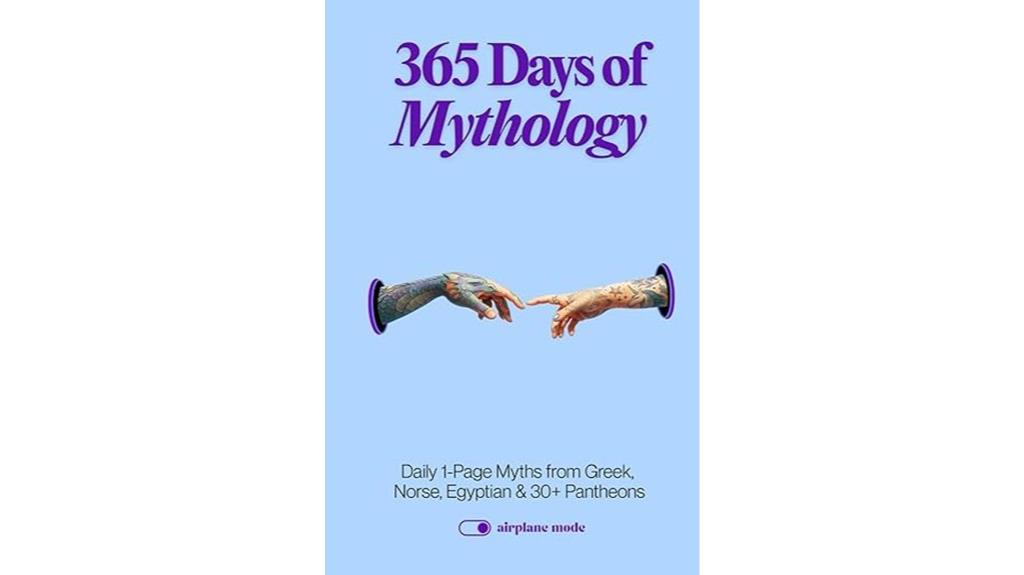
For anyone curious about Egyptian mythology but overwhelmed by complex details, “Days of Mythology” offers a perfect entry point with its concise, one-page stories. Each myth is self-contained, providing a quick yet insightful glimpse into gods, monsters, and legends from over 30 cultures, including Egypt. The stories are easy to follow, making mythology accessible for beginners and seasoned enthusiasts alike. Whether read during a morning break or before bed, this book makes exploring world mythologies simple and engaging. Its bite-sized format sparks curiosity without requiring extensive background knowledge, making it an ideal companion for discovering Egypt’s rich mythological heritage.
Best For: beginners and casual readers interested in exploring Egyptian mythology in a quick, accessible format without feeling overwhelmed.
Pros:
- Concise, one-page stories that are easy to read and understand
- Offers a broad overview of Egyptian gods, monsters, and legends in a manageable format
- Perfect for daily reading, quick learning, or as a gift for mythology enthusiasts
Cons:
- Lacks detailed background or in-depth context for complex myths
- No table of contents or indexing for easy browsing of specific topics
- Some readers may desire more comprehensive or scholarly information
Egyptian Mythology for Teens: Enthralling Myths from Ancient Egypt
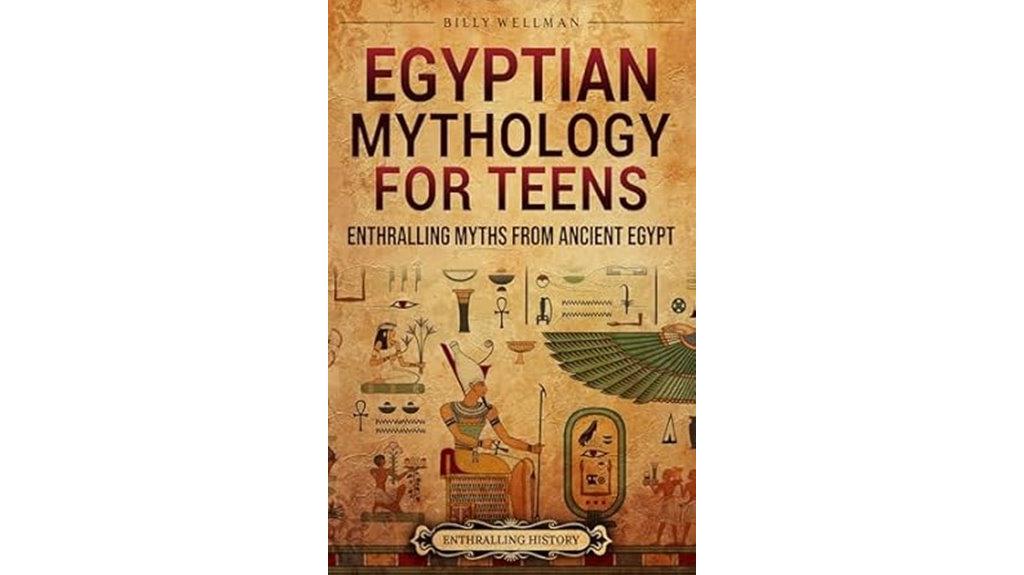
Looking for an engaging way to introduce teenagers to the fascinating world of ancient Egypt? “Egyptian Mythology for Teens” makes learning fun and accessible with its compelling stories, vivid images, and clear explanations. It covers everything from gods and creation myths to temples, the underworld, and natural phenomena like Nile floods. Designed for young readers, it simplifies complex topics without losing their richness, making it perfect for homeschooling or casual interest. With activities and pronunciation guides, it helps teens connect mythology to daily life and values. This book is a fun, informative resource that deepens understanding of Egypt’s incredible cultural heritage.
Best For: Teens interested in exploring Egyptian mythology in an engaging, easy-to-understand way, perfect for homeschooling or casual learning.
Pros:
- Captivating stories and vivid images make learning enjoyable and memorable.
- Clear, age-appropriate language simplifies complex topics without losing depth.
- Includes activities and pronunciation guides to enhance interactive learning and connection to daily life.
Cons:
- Might oversimplify some myths for the sake of accessibility, reducing depth for advanced readers.
- Focused mainly on introductory content, which may not satisfy those seeking in-depth scholarly details.
- As a physical or digital resource, it may lack extensive supplementary materials for further research.
Egyptian Mythology A to Z, Third Edition

Egyptian Mythology A to Z, Third Edition, stands out as an essential resource for a diverse audience, from curious beginners to seasoned scholars. I find it incredibly accessible, thanks to its alphabetized format that makes complex topics easy to navigate. The book offers detailed insights into gods, myths, and cultural practices, supported by vivid illustrations and excerpts from sacred texts. I appreciate how it combines thorough research with engaging storytelling, making Egypt’s mythological world come alive. Whether you’re constructing educational displays or simply exploring Egypt’s rich mythology, this book provides a exhaustive and reliable reference that deepens understanding and sparks curiosity.
Best For: anyone interested in exploring Egyptian mythology, from beginners and students to scholars and enthusiasts seeking a comprehensive, accessible reference.
Pros:
- Highly accessible and easy to navigate with its alphabetized format
- Richly illustrated with photographs, line drawings, and excerpts from sacred texts
- Provides detailed insights into gods, myths, and cultural practices, suitable for a wide audience
Cons:
- May lack the depth required for advanced scholars seeking highly specialized information
- Some readers might find the broad scope overwhelming without prior knowledge
- The focus on general overview might limit in-depth analysis of specific mythological topics
Gods and Goddesses of Ancient Egypt: Egyptian Mythology for Kids

If you’re curious about the fascinating gods and goddesses of ancient Egypt, this book is a perfect choice for kids enthusiastic to explore mythology. It offers clear, well-structured information about Egyptian deities, making complex stories accessible for young readers. The vivid illustrations bring these gods to life, capturing their cosmic and timeless qualities. Designed for children ages 7 to 11, it balances engaging storytelling with educational depth, helping kids understand Egyptian beliefs, culture, and history. Whether for learning or curiosity, this book is a great introduction to Egyptian mythology that both kids and adults will enjoy.
Best For: children ages 7 to 11 who are curious about Egyptian mythology, history, and culture, as well as educators and parents seeking an engaging educational resource.
Pros:
- Provides accurate and detailed information about Egyptian gods and mythology in an accessible way for children
- Beautiful, authentic illustrations that enhance understanding and interest in Egyptian culture
- Well-structured chapters making complex stories manageable and engaging for young readers
Cons:
- Slightly advanced vocabulary and themes may require adult assistance for younger children
- Some reviewers wish for a hardcover edition for durability and long-term use
- Paper quality issues noted by some, though overall the book is highly valued as an educational resource
Factors to Consider When Choosing Egyptian Mythology Reference Books
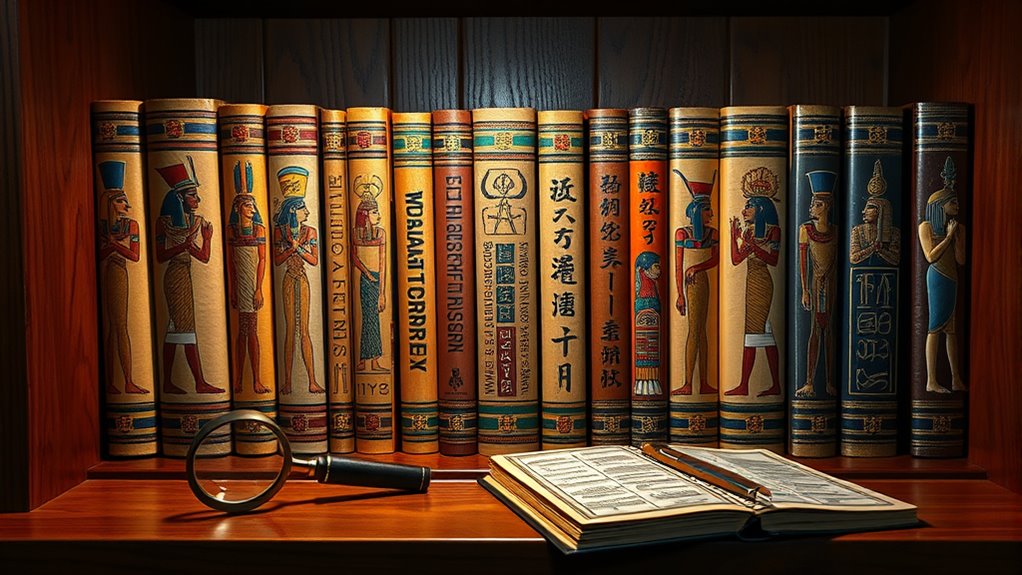
When choosing Egyptian mythology reference books, I always consider the content’s scope and depth to guarantee it matches my interests. I also look for high-quality visuals and clear organization to make the information engaging and easy to follow. Most importantly, I check the credibility of the sources to ensure I’m getting accurate and reliable details.
Content Scope and Depth
How do you decide which Egyptian mythology book is right for you? First, consider whether you want a broad overview of gods and myths or a focus on specific deities. Think about your purpose—are you seeking simplified summaries for casual reading or in-depth analyses for research? Check if the book offers detailed stories, cultural context, and explanations or just basic descriptions. It’s also important to see if it covers regional variations, different creation myths, and how beliefs evolved over time for a thorough view. Finally, match the scope and depth to your interest level, whether you’re curious, studying academically, or delving into advanced research. Choosing a book aligned with your goals ensures a fulfilling and enriching experience.
Visual and Illustration Quality
Choosing the right Egyptian mythology reference book goes beyond content scope; visual and illustration quality greatly influence how well you understand and enjoy the material. High-quality images of gods, symbols, and artifacts help you accurately identify mythological themes and iconography, especially if you’re a visual learner. Clear, detailed diagrams and charts can simplify complex relationships among deities and stories, making them easier to grasp. Authentic artwork, such as hieroglyphs and temple carvings, adds cultural depth and authenticity, enriching your learning experience. Colorful, well-organized visuals that are properly labeled improve retention and accessibility across all ages. Ultimately, engaging illustrations make the mythology more vivid, memorable, and enjoyable, turning a good book into a truly immersive resource.
Target Audience Suitability
Selecting an Egyptian mythology book that suits your or your audience’s needs requires careful consideration of age and reading level. You want to guarantee the content is engaging and appropriate, whether for children, teens, or adult learners. Look for books that use accessible language and clear explanations, especially if your audience is new to Egyptian mythology. Visual aids like illustrations or diagrams can enhance understanding, particularly for visual learners. Check whether the book covers foundational myths and key deities relevant to the audience’s familiarity with Egyptian culture and history. A good fit balances educational depth with readability, matching the audience’s prior knowledge and interest level. This thoughtful approach ensures the book will be both informative and enjoyable.
Source Credibility and Accuracy
When evaluating Egyptian mythology books, verifying their source credibility and accuracy is vital to guarantee you’re getting reliable information. I look for books that cite reputable sources, such as archaeological findings, primary texts, and scholarly research, to ensure historical accuracy. The author’s credentials in Egyptology or related fields also matter, as expertise adds weight to their interpretations. I check for references, footnotes, or a bibliography, which demonstrate thorough research and transparency. It’s important that the content aligns with current scholarship and recent discoveries, avoiding outdated or overly mythologized views. Ultimately, I prefer books that clearly distinguish between established facts and speculative or mythological elements, providing clarity and helping me differentiate between reliable information and interpretations.
Organizational Structure Ease
A well-organized Egyptian mythology book makes it much easier to find the information you need quickly and efficiently. Clear hierarchical structures, like alphabetical entries or themed sections, help locate gods, myths, or topics without hassle. A detailed table of contents and extensive indexes—organized by deity, culture, or theme—are essential for quick navigation. Consistent formatting and headings across entries make comparing gods, stories, or concepts straightforward. Including cross-references within entries allows you to explore related mythological figures seamlessly, saving time flipping through pages. Visual aids such as charts, diagrams, or tables, aligned with the book’s structure, enhance understanding and retention of intricate relationships. Overall, a well-designed organizational layout greatly improves your reading experience and knowledge acquisition.
Coverage of Mythical Figures
To choose an Egyptian mythology reference book that truly covers the breadth of mythological figures, you should look for one that includes both major gods like Ra, Osiris, and Isis, as well as lesser-known deities and regional variations. A exhaustive book should detail each figure’s stories, attributes, and symbolism to deepen your understanding. It’s important that the resource features both human and animal-headed gods, reflecting Egypt’s diverse representations. Additionally, check if it provides context within religious practices, rituals, and cultural beliefs, offering insight into their significance. Accurate, detailed information about relationships, origins, and roles ensures a thorough grasp of the mythological landscape. This approach guarantees you’ll gain a well-rounded view of Egypt’s rich pantheon.
Price and Accessibility
Considering the cost and format options of Egyptian mythology books is essential to ensuring you find a resource that fits your budget and access needs. I recommend checking if the price aligns with your budget, especially for exhaustive volumes that tend to be pricier. It’s also helpful to see if the book is available in various formats like paperback, hardcover, or digital, as this impacts both accessibility and affordability. Exploring multiple retailers or libraries can help you find better deals and easier access. Additionally, look for editions that include illustrations, glossaries, or appendices, which add value for the price. Keep in mind that highly detailed or specialized books might cost more but often provide in-depth, accessible insights that are worth the investment.
Frequently Asked Questions
Which Egyptian Gods Are the Most Important for Modern Readers?
When considering which Egyptian gods matter most today, I think of Osiris, Isis, and Ra. These deities embody themes of life, death, rebirth, and power that still resonate. Osiris represents the cycle of death and renewal, Isis symbolizes protection and motherhood, and Ra embodies the sun’s essential energy. For modern readers, these gods offer insight into ancient beliefs that continue to influence spirituality and culture.
How Can I Differentiate Between Myth and Historical Fact in These Books?
Myth and history often dance together in ancient Egyptian texts, making it tricky to tell them apart. I always check the author’s background and look for citations of archaeological evidence. When a story explains natural phenomena or gods’ origins, it’s myth. But if it references specific dates, artifacts, or inscriptions, it’s more likely historical fact. Always question sources and cross-reference to uncover the truth behind the stories.
Are There Any Books Focusing on Egyptian Mythology’s Influence on Later Cultures?
You’re curious about books exploring Egyptian mythology’s influence on later cultures. I’ve found several insightful titles that examine how Egyptian stories and symbols shaped Greek, Roman, and even modern traditions. These books highlight the enduring power of Egyptian myths and their cultural adaptations over time. If you’re interested, I recommend looking for works by scholars like Geraldine Pinch or Jan Assmann, who analyze these fascinating cultural exchanges in detail.
Which Books Are Suitable for Advanced Readers and Scholars?
Imagine if Cleopatra had access to today’s scholarly texts—advanced readers and scholars need similarly exhaustive resources. I recommend “The Oxford Encyclopedia of Ancient Egypt” for in-depth articles, and “Egyptian Mythology: A Guide to the Gods, Goddesses, and Traditions” by Geraldine Pinch. These books explore complex themes, archaeological evidence, and cultural influences, making them perfect for anyone seeking a thorough understanding of Egyptian mythology at an academic level.
How Do These Books Address the Symbolism Behind Egyptian Mythological Creatures?
When exploring Egyptian mythological creatures, these books explore their symbolism by analyzing their roles in myths, religious texts, and art. I find they often explain how creatures like the Sphinx embody wisdom and power, while others symbolize protection or chaos. These texts provide detailed interpretations, helping me understand the deeper spiritual meanings behind each creature, making the mythology richer and more meaningful.
Conclusion
Diving into Egyptian mythology is like opening a treasure chest—there’s so much to discover. Did you know that over 2,000 gods and goddesses appeared in ancient texts? With these books, you’ll uncover stories that brought gods to life and shaped civilizations. Whether you’re new or seasoned, these references will deepen your understanding and ignite your curiosity. Start exploring today—you never know what ancient secrets you might uncover!

